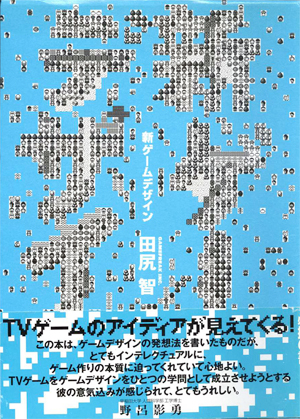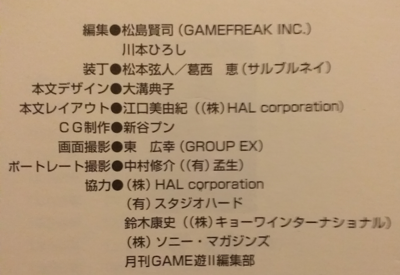| Site Notice |
|---|
|
We have a limited coverage policy. Please check our coverage page to see which articles are allowed. |
Shin Game Design
Shin Game Design (usually known in English under unofficial literal translation New Game Design), ©1995 Satoshi Tajiri (ISBN4-87025-858-7) is a book written and produced by Satoshi Tajiri, the creator of the Pokémon franchise about the process of video game creation, video game company works such as from Nintendo, the history of Game Freak, as well as a brief mention of the upcoming Pokémon Red and Green.
This includes a summary of the game, some relatively very early prototype sprites from the game on the front cover and back cover[1] and two close to final release prerelease screenshots with an unidentified border.
The book also includes color fold-out pages of a few games by many companies, in chronological order.
The book is valuable and has only officially been released in Japanese.
Contents
Nintendo games mentioned
- Donkey Kong (on fold-out pages and in book)
- Mario Bros. (on fold-out pages)
- Donkey Kong Jr. (on fold-out pages)
- Kirby's Dream Land
- The Legend of Zelda
- Mother
- SimCity
- Yoshi's Island
- Super Mario World
- Mario no Picross
- Super Mario Bros. 3
- Super Mario Bros. (Super Mario All-Stars version)
- Super Mario Bros.: The Lost Levels
- Wario no Mori
- EarthBound
- Game Boy Wars
- Yoshi (also developed by Game Freak)
- Mario to Wario (also developed by Game Freak)
- Pokémon Red and Green
Game Freak only game/merchandise mentions
- Mendel Palace
- Nontan no KuruKuru Puzzle
- Jerry Boy
- Pulseman
Third party series with at least one Nintendo published game
- Tetris series
- Dragon Quest series (Dragon Warrior, non-Nintendo published Dragon Warrior games)
Other relevant mentions
- Nintendo Entertainment System
- Super FX Chip
- Active Time Battle System
- "Side-view" concept in video games
- RGB and RF television terms
- CD-ROM concept
- Tetris inspired rotation mechanics
Production credits
- Enix Co., Ltd (publishers)
External links
On NIWA member wikis
References
| This article is a stub. You can help NintendoWiki by expanding it. |

